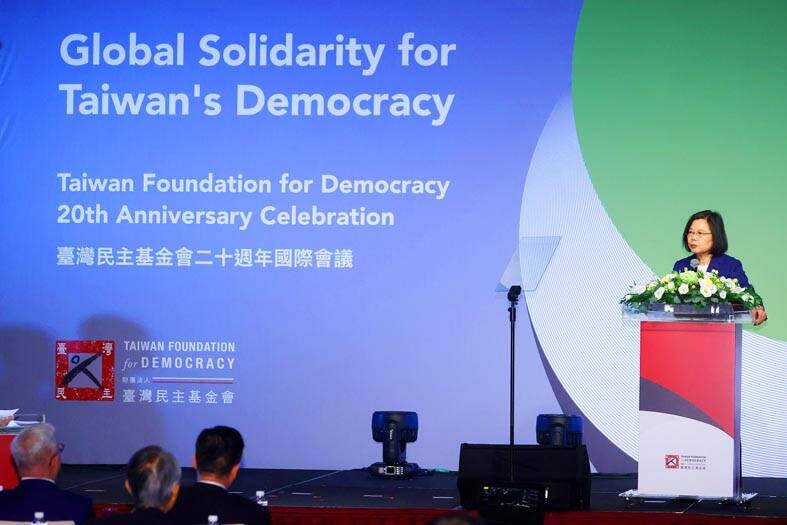Taiwan would confront the destabilizing forces working against democracies while strengthening cooperation with democratic nations, President Tsai Ing-wen (蔡英文) said in Taipei yesterday at an event marking the 20th anniversary of the state-financed Taiwan Foundation for Democracy.
Democratic nations and the rules-based international community are confronting their “greatest challenge” since the Cold War, Tsai said.
Authoritarian regimes are mounting an effort to “corrode our democratic institutions and undermine human rights” in a bid to spread societal distrust and weaken public confidence in democracy, she said.

Photo: CNA
Taiwan is familiar with these efforts since the nation has long been exposed to Beijing’s threatening military exercises, economic coercion, cyberattacks and disinformation campaigns, she added.
Taiwanese are unbowed against the challenge of authoritarianism and fight it each day to preserve their democratic way of life, Tsai said, urging the world’s democracies to cooperate against the common threat.
“If we want to meet this challenge, we must work together as democracies to counter the tactics that authoritarian regimes use to undermine our institutions,” she said.
Legislative Speaker You Si-kun (游錫?), who is chairman of the foundation, said Taiwanese must recover their democratic spirit to protect national sovereignty and democratic institutions from the authoritarian onslaught.
The nation did not obtain its vaunted status of being a democratic exemplar as a gift from the heavens, but through the “blood and tears” of democracy pioneers, he said.
The sphere of democracies has receded in a worrying trend over the past decade, with Beijing imposing its National Security Law on Hong Kong and the Russian invasion of Ukraine, You said, adding that democracy is declining globally according to Freedom House’s rankings last year.
The attacks on freedoms by authoritarian regimes and the failure of democratic consolidation are both to blame for the setbacks dealt to democracies across the world, he said.
Taiwan’s democracy is threatened by “military intimidation from the Chinese Communist Party (CCP) externally, coupled with challenges arising from a historical legacy of authoritarian party-state education and cognitive warfare carried out by the CCP within Taiwan,” You said.
A free people with the will to defend themselves is the ultimate foundation of national defense and Taiwan must rediscover its democratic spirit to be truly secure, he said, calling for a global stance for freedom.
You expressed Taiwan’s solidarity with Ukraine, adding that both nations are on the front line of the struggle against authoritarianism and that Taiwanese would also defend universal values with their lives.
US National Endowment for Democracy president Damon Wilson, who presented Tsai with the endowment’s Democracy Service Medal, said China’s bid to coerce Taiwan is “part of a broader global assault on democracy.”
Defending freedom requires a coordinated and focused response from democracies, he said, adding that the world must stand in solidarity with Ukraine in its fight against Russian aggression and Taiwan’s efforts to protect its democracy.
At the same, Taiwanese should be mindful that “democracy is [their] security,” Wilson said.
“As Taiwan deepens its democracy at home, it bolsters its own security,” he said.

MAKING WAVES: China’s maritime militia could become a nontraditional threat in war, clogging up shipping lanes to prevent US or Japanese intervention, a report said About 1,900 Chinese ships flying flags of convenience and fishing vessels that participated in China’s military exercises around Taiwan last month and in January have been listed for monitoring, Coast Guard Administration (CGA) Deputy Director-General Hsieh Ching-chin (謝慶欽) said yesterday. Following amendments to the Commercial Port Act (商港法) and the Law of Ships (船舶法) last month, the CGA can designate possible berthing areas or deny ports of call for vessels suspected of loitering around areas where undersea cables can be accessed, Oceans Affairs Council Minister Kuan Bi-ling (管碧玲) said. The list of suspected ships, originally 300, had risen to about 1,900 as

Japan’s strategic alliance with the US would collapse if Tokyo were to turn away from a conflict in Taiwan, Japanese Prime Minister Sanae Takaichi said yesterday, but distanced herself from previous comments that suggested a possible military response in such an event. Takaichi expressed her latest views on a nationally broadcast TV program late on Monday, where an opposition party leader criticized her for igniting tensions with China with the earlier remarks. Ties between Japan and China have sunk to the worst level in years after Takaichi said in November that a hypothetical Chinese attack on Taiwan could bring about a Japanese

MORE RESPONSIBILITY: Draftees would be expected to fight alongside professional soldiers, likely requiring the transformation of some training brigades into combat units The armed forces are to start incorporating new conscripts into combined arms brigades this year to enhance combat readiness, the Executive Yuan’s latest policy report said. The new policy would affect Taiwanese men entering the military for their compulsory service, which was extended to one year under reforms by then-president Tsai Ing-wen (蔡英文) in 2022. The conscripts would be trained to operate machine guns, uncrewed aerial vehicles, anti-tank guided missile launchers and Stinger air defense systems, the report said, adding that the basic training would be lengthened to eight weeks. After basic training, conscripts would be sorted into infantry battalions that would take

DEEP-STRIKE CAPABILITY: The scenario simulated a PLA drill that turned into an assault on Taiwan’s critical infrastructure, with the launchers providing fire support Taiwan yesterday conducted this year’s first military exercises at Longsiang Base in Taichung, demonstrating the newly acquired High Mobility Artillery Rocket System’s (HIMARS) ability to provide fire support and deep-strike capabilities. The scenario simulated an attack on Penghu County, with HIMARS trucks immediately rolling into designated launch areas and firing barrages at the Wangan (望安) and Cimei (七美) islands, simulating the provision of fire support against invading forces. The HIMARS are supposed to “fire and leave,” which would significantly increase personnel and equipment survivability, a military official said. The drill simulated an exercise launched by the Chinese People’s Liberation Army (PLA) Eastern